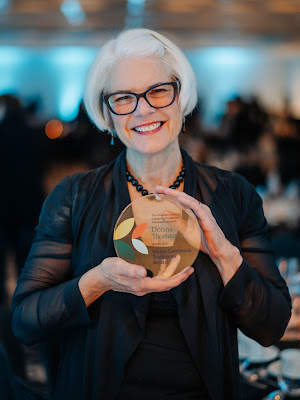
I had the pleasure and privilege of attending the Canadian Caregiving Summit from November 6-8 in Ottawa, Canada. I cannot begin to tell you how thrilling it was to join with so many national and international caregivers, researchers, front line workers and policymakers. Together, we kickstarted a movement for public policy change in Canada to support caregivers, both paid and unpaid. I know that I speak for everyone at the Summit when I say that we know change is coming!
So, in a nutshell, here’s what happened at the conference on Day 1:
Host and caregiver Ron Beleno introduced Elder and Chancellor of the University of Ottawa, Claudette Commanda to give her blessing to us all. We felt a sense of history, love and belonging in her beautiful words. She talked about LOVE – a word that I believe belongs caregiving conversations!
Next, Dr. Naomi Azrieli, CEO and Chair of the Azrieli Family Foundation introduced the roots and context of the conference and the Canadian Centre for Caregiving Excellence. Both the centre and the summit are powered by the Azrieli Foundation and it was Naomi who originally posed the idea of a national caregiver support initiative to the foundation board two and half years ago. Dr. Azrieli spoke movingly about working together to improve care in a fractured and violent world – a world on fire. She said, “We are grieving. We are stressed. But our initiative and many others besides, give us solace and energy. This summit gives us an incredible sense of possibility.” Naomi described the moment when the idea of a caregiver support initiative first was proposed. “We didn’t know what this idea would look like but we knew that Canadian caregivers were in crisis”, she said, “and we are still in crisis. And it is only by bringing many voices together that we can enact change.” It was a thrilling spark to ignite the discussions that would follow.
Liv Mendelsohn was the next speaker. Liv is the Executive Director of CCCE and she took a deeply personal approach in her remarks. She described the circles and cycles of care in her family beginning with her mother Lillian and “Bubby” Myra. When Liv’s babies were born, Lillian cradled them to give Liv a much needed rest. Myra’s hand guided the very young Liv safely across the street and when Myra was diagnosed with Alzheimer’s Myra moved into Liv’s family home. Then it was Liv’s hand that guided Myra safely across the street. When Mom Lillian was diagnosed with terminal cancer, Liv became caregiver again until her beloved mother died. Today, caring for her father, Liv is looking to the future. She observed that her children will care for her, bringing care in Liv’s family full circle.
Then, Liv presented new data from a national survey of caregivers in Canada. This is what we learned:
- 90% of respondents need broader financial support
- 2/3 of caregivers report financial hardship that is tied to caregiving duties
- 94% need better access to home care services
- only 25% feel well supported by government
- 64% of care providers say higher pay is needed for job satisfaction
- 1/3 of care providers have thought about leaving the profession due to low wages and burnout or stress
Next, distinguished health journalist at the Globe and Mail and author, Andre Picard, gave a keynote titled Why Care Matters. He set the stage by observing that people are living longer than ever before and in an aging society, that reality is worth celebrating, not catastrophising. Picard’s speech centred on the theme of respect: respect for women who make up the majority of caregivers and respect for patients and their health care and dependency needs. He remarked that the 53,000 deaths of seniors from Covid in Canada constituted a “massacre of neglect” based on ageism and ableism that is embedded in our health policies. Picard called for a transfer of funding from long term care to home and community care in order to end “the apartheid that is the reality of over 400,000 Canadians living in institutional settings when they would rather be at home with support.” Andre Picard reminded everyone, especially the policymakers in the room, that policy change with teeth and funding is required if we truly want a future that includes respect for people with care needs and their families.
Reciprocity in Care was the next panel, recorded by moderator Terrence Ho and siblings Amy and Holly Mathers. Born with a genetic disability causing severe kidney disease, Amy Mathers received a kidney transplant at a young age. The sisters bonded in adulthood over “survivor guilt” – Amy because a healthy child had died to save her life with a new kidney and Holly, because Amy was born with a genetic disease, not herself. They described the term “club sandwich caregiving” as opposed to simple “sandwich caregiving”. It was a term that many conference-goers would use to describe their own situations with layered and multi-generational caregiving.
There were many more exciting panels on November 6 and you can read about them HERE.

Photo provided by CCCE and taken by Byfield-Pitman
For me, the highlight of the day and of my working life happened at the Gala that evening. I was awarded the Vickie Cammack Trailblazer Award. The Vickie Cammack Trailblazer Award is awarded to a passionate individual who has demonstrated unwavering dedication to changing the landscape for caregivers and/or care providers in Canada. I was moved to tears because Vickie was my friend and my mentor. Her husband Al Etmanski, Canada’s most brilliant social innovator in disability poverty reduction, gave a speech as did Vickie’s daughter, Lena. Vickie died on December 27, 2022 from pancreatic cancer. She was a personal hero and close friend. You can read more about her remarkable contributions to caring families HERE.
My next blog post will take you through the highlights of the Canadian Caregiving Summit, Day 2!